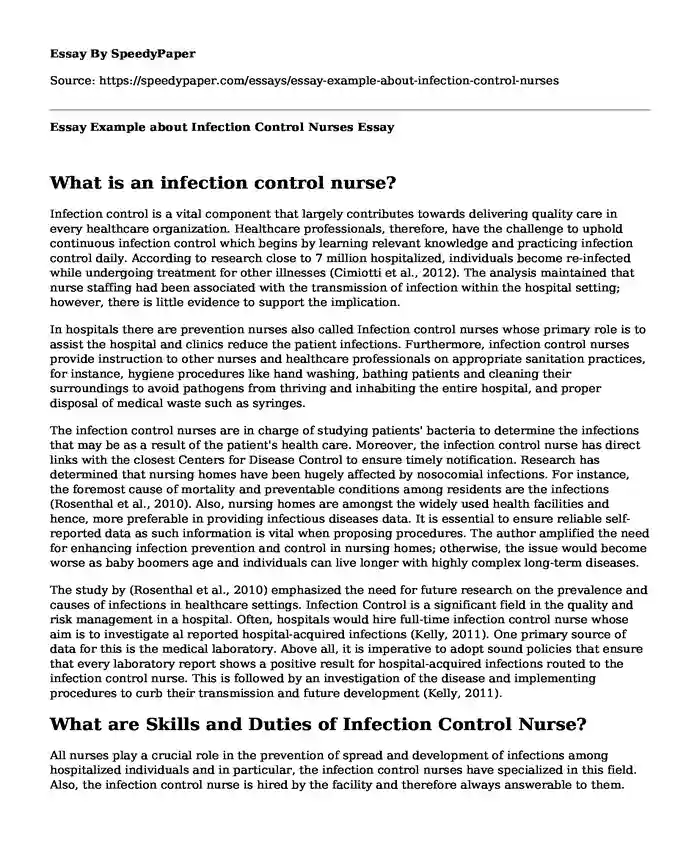What is an infection control nurse?
Infection control is a vital component that largely contributes towards delivering quality care in every healthcare organization. Healthcare professionals, therefore, have the challenge to uphold continuous infection control which begins by learning relevant knowledge and practicing infection control daily. According to research close to 7 million hospitalized, individuals become re-infected while undergoing treatment for other illnesses (Cimiotti et al., 2012). The analysis maintained that nurse staffing had been associated with the transmission of infection within the hospital setting; however, there is little evidence to support the implication.
In hospitals there are prevention nurses also called Infection control nurses whose primary role is to assist the hospital and clinics reduce the patient infections. Furthermore, infection control nurses provide instruction to other nurses and healthcare professionals on appropriate sanitation practices, for instance, hygiene procedures like hand washing, bathing patients and cleaning their surroundings to avoid pathogens from thriving and inhabiting the entire hospital, and proper disposal of medical waste such as syringes.
The infection control nurses are in charge of studying patients' bacteria to determine the infections that may be as a result of the patient's health care. Moreover, the infection control nurse has direct links with the closest Centers for Disease Control to ensure timely notification. Research has determined that nursing homes have been hugely affected by nosocomial infections. For instance, the foremost cause of mortality and preventable conditions among residents are the infections (Rosenthal et al., 2010). Also, nursing homes are amongst the widely used health facilities and hence, more preferable in providing infectious diseases data. It is essential to ensure reliable self-reported data as such information is vital when proposing procedures. The author amplified the need for enhancing infection prevention and control in nursing homes; otherwise, the issue would become worse as baby boomers age and individuals can live longer with highly complex long-term diseases.
The study by (Rosenthal et al., 2010) emphasized the need for future research on the prevalence and causes of infections in healthcare settings. Infection Control is a significant field in the quality and risk management in a hospital. Often, hospitals would hire full-time infection control nurse whose aim is to investigate al reported hospital-acquired infections (Kelly, 2011). One primary source of data for this is the medical laboratory. Above all, it is imperative to adopt sound policies that ensure that every laboratory report shows a positive result for hospital-acquired infections routed to the infection control nurse. This is followed by an investigation of the disease and implementing procedures to curb their transmission and future development (Kelly, 2011).
What are Skills and Duties of Infection Control Nurse?
All nurses play a crucial role in the prevention of spread and development of infections among hospitalized individuals and in particular, the infection control nurses have specialized in this field. Also, the infection control nurse is hired by the facility and therefore always answerable to them. Most cases, the infection control nurse works in conjunction with the hospital's infection committee and thus, accountable to the chairperson of the committee as well. Some nurses share hospital responsibilities such practicing proper hygiene, monitoring patients and implementing other procedures aimed at keeping patient's safe and hospitals sterile. There are instances where the hospital is to operate under the jurisdiction of the infection control nurse, and disputes may arise between the medical staff and hospital administration. It is imperative that the medical staff is aware of such, and take into account instituting programs pertinent to these issues.
Various studies have provided the general roles of infection control nurse including visiting the medical laboratory to review culture results and consult with the laboratory attendants, informal teaching with patients and other medical professionals, leading an infection control orientation program, conferring with departmental heads throughout the facility, and continually reporting to Centers for diseases in case of any infections (Brewer, 2011).
How infection Control Nurses Neither Different than the Regular Nurses or who nor Certified with Infection Control Program?
There are differences between an infectious disease nurse and an infection control nurse. One significant difference between the two is that a regular nurse works with infectious diseases whereas the Infection control nurse' role is more of administrative as they follow guidelines and ensure all the appropriate procedures are implemented to prevent infection.
References
Kelly, P. (2011). Nursing leadership & management. Cengage learning.
Rosenthal, V. D., Maki, D. G., Jamulitrat, S., Medeiros, E. A., Todi, S. K., Gomez, D. Y., ... & Wong, F. M. R. (2010). International nosocomial infection control consortium (INICC) report, data summary for 2003-2008, issued June 2009. American journal of infection control, 38(2), 95-104.
Cimiotti, J. P., Aiken, L. H., Sloane, D. M., & Wu, E. S. (2012). Nurse staffing, burnout, and health care-associated infection. American journal of infection control, 40(6), 486-490.
Brewer, E. P. (2011). Successful techniques for using human patient simulation in nursing education. Journal of Nursing Scholarship, 43(3), 311-317.
Cite this page
Essay Example about Infection Control Nurses. (2022, Mar 11). Retrieved from https://speedypaper.com/essays/essay-example-about-infection-control-nurses
Request Removal
If you are the original author of this essay and no longer wish to have it published on the SpeedyPaper website, please click below to request its removal:
- The Placer Uranium and Gold Deposits - Geology Essay Example
- Essay Sample Describing the World Bank Development Activities and Progress in Brazil
- Essay Sample Dedicated to Social Workers in School Settings
- Comparing Int'l & Local Company Strategies for Success
- Free Essay Example - Vehicle Searches
- Essay Sample on Analysis on the Effects of Population Growth
- Financial Research Report of Home Depot Inc. Paper Example
Popular categories





